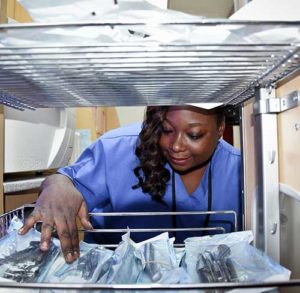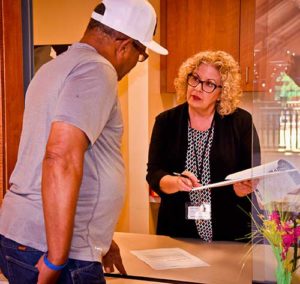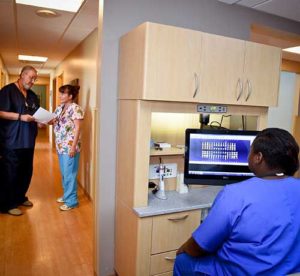MILWAUKEE — Not many people look forward to visiting the dentist. But for individuals with special needs, something as simple as a routine cleaning can be an almost impossible ordeal.

Dental assistant Sylvanna Lowery looks over dental tools at the new Gardetto Family Community Dental Clinic at St. Ann Center for Intergenerational Care’s Bucyrus campus. The clinic opened Aug. 29 and serves adults and children with physical or cognitive disabilities. (Catholic Herald photo by Juan C. Medina)
Whether the issue is the physical inability to get in and out of the chair or a similar cognitive or emotional barrier, regular dentists’ offices just aren’t set up to cater to this demographic – “a population who has slipped through the cracks” in regards to oral health, said Greenfield-based dentist Russell Dunkel.
Dunkel has treated the elderly as well as patients with disabilities since his residency in the early 1980s.
“There’s always been a problem with access to care where oral hygiene is concerned,” he said. “It can be either a physical or a cognitive disability that makes it just very hard to get in there (for an appointment).”
With this population in mind, the St. Ann Center for Intergenerational Care has established the Gardetto Family Community Dental Clinic at its Bucyrus Campus on North Avenue. The clinic, which opened on Aug. 29, serves adults and children with physical or cognitive disabilities that prevent them from receiving care in a traditional setting. Dunkel is the clinic’s dental director.
Hygienist recognized need for services
The idea was suggested by Laura Cherek, director of dental services at St. Ann. A registered dental hygienist, Cherek began the Smiles for Sr. Lucille program seven years ago, brushing the teeth of St. Ann’s clients and helping them develop an at-home dental hygiene plan.
“The need became evident to me almost immediately that nobody was seeing the dentist,” she said. “So I tried getting ahold of all the caretakers and social workers and nurses that I could.”
She found that getting access to dental care, for a variety of reasons, was difficult for the people St. Ann serves. “There are so many barriers,” she said.
One considerable obstacle was that Medicaid, the insurance provider for most St. Ann’s clients, is accepted by a much smaller network of dentists.
“A lot of dentists that do take state (insurance) a lot of times don’t have the facilities. The people can get into the door and get into the bathroom, but they can’t get into the operatory. Operatories are way too small if you’re in a wheelchair,” said Cherek.
She tried to help place clients at accessible clinics but “I think in all the years I’ve been doing it, I’ve only placed four or five of our clients into a dental office, out of hundreds.”

Kathy Lopac, administrative assistant at the Gardetto Family Community Dental Clinic, Milwaukee, chats with a client. (Catholic Herald photo by Juan C. Medina)
Population had been poorly served
She mentioned the problem to others in the dental community through her work with the Milwaukee County Oral Health Task Force.
“Everybody knew that this population was one of the lowest-served populations in dentistry,” she said.
Fellow task force member Dunkel volunteered to help. The former director of the Bread of Healing non-charging clinic, he had experience with serving individuals for whom access to care is an issue.
“If the patient is state-supported, the reimbursement rate is considerably low,” he said. This means that, for many dentists, the inducement to accept Medicaid is simply not there. It’s also a lot more difficult to accommodate a patient with special needs. “It takes more time. What may be normally a 10 minute exam for a patient without a disability in the office could take 30, 40, 50 minutes for somebody with a severe disability in the office.”
“Private dentists and public clinics … don’t have the money or the time to be able to spend three times as long on a client who has a cognitive disability,” said Cherek, adding they also might not have the proper training or equipment.
Pediatric dentists not ideal to treat adults
Options for these individuals and their families in the Milwaukee area were extremely limited. Many used to make the trip to visit the Max W. Pohle Dental Clinic, but that closed in 2015. Children’s Hospital of Wisconsin treats a number of pediatric patients with disabilities and will often continue to see them into adulthood – although that is not an ideal solution.[su_pullquote align=”right”]For more information on the Gardetto Family Community Clinic, visit www.stanncenter.org/clinic or call (414) 210-2440.[/su_pullquote]
“As a specialist in pediatric dentistry, my skill set is in pediatric dentistry,” said Dr. Lori Barbeau, medical director of the dental clinic at CHW. “As those individuals start to grow into adulthood, they start to have more adult-like dental needs, such as periodontal disease, tooth loss, replacement of teeth that are lost. That is not really the bread and butter skill set of a pediatric dentist.”
“When a kid is between the age of 12, 13, 14 and they start to get all of their permanent teeth, it’s typically the time where we transition them to the general dentist,” said Pamela Fraser, director of dental services at CHW. “However, with our patients with special health care needs, up until this point, we have not had that option. There’s a huge part of the population of individuals with special needs that really have never had the resource.”
Patients thankful for clinic’s services
Renee Prink’s daughter Kayla, age 23, is one of those individuals. Kayla was born with Cornelia de Lange syndrome, a rare genetic disorder that causes dwarfism, limb deformities and developmental delays such as the inability to speak. Kayla is non-verbal, deaf and legally blind, and taking care of her oral hygiene needs was a traumatic experience for her as well as for her caregivers, said Prink.

Dr. Russ Dunkel, dental clinic director and Laura Cherek, director of dental programs are engaged in a discussion in the hallway of the Gardetto Family Community Dental Clinic, Milwaukee, while dental assistant Sylvanna Lowery looks over an image on the computer. (Catholic Herald photo by Juan C. Medina)
“Even if you’re just trying to check her teeth, she would fight like you were trying to kill her. She would fight with everything she had in her. She just doesn’t understand, and you can’t reason with her,” she said. Kayla would often have to be restrained, immobilized or given general anesthesia for even a simple cleaning. “Some of the dentists were bitten. She would just scream.”
Since August, Kayla has been having regular teeth cleanings at the Gardetto Family Clinic with Dr. Dunkel.
“She comes home happy,” said Prink. “They’ve done so well with her.”
Jodi Tyler is also grateful for the clinic. A St. Ann’s client for three years, Tyler was diagnosed with second-stage progressive MS and uses a wheelchair. In the past, she would get teeth brushing services from Cherek, but “it’s not the same as a check-up,” said her younger sister Julie Calteaux.
Before coming to live with Calteaux in Wisconsin, Tyler resided in a nursing home in Texas. She was visited there by a mobile dental unit, but in the Milwaukee area, Calteaux was told there are significantly fewer resources. “Laura at St. Ann’s told me, the only place for people in a wheelchair to go (for dental services) is up to Madison. I said no, that’s not going to work,” she said.
But at the Gardetto Family Clinic, the operatories and even hallways are wide enough for Tyler’s wheelchair. She doesn’t have to be moved from it during the entire visit. Thanks to the office’s panoramic camera, Dr. Dunkel spotted some fillings that Tyler should have replaced and Calteaux is relieved she won’t have to take her to a hospital and force her to undergo general anesthesia.
Clinic hopes to be a ‘dental home’ for patients
Cherek said St. Ann’s has raised a little over $600,000 in three years to open the clinic, also funded by grants from the Wisconsin Department of Health Services, Delta Dental, the Ziemann Foundation Inc. and the Greater Milwaukee Dental Association.
Staff say they hope the clinic will be a “dental home” for its clients – “where they get to know their dentist, know their hygienist, come back every six months like you’re supposed to, get X-rays, get exams, get cleanings and also restorative work,” said Cherek.
The clinic is only seeing patients on Mondays and Fridays, but hopes to soon be able to expand those hours to include Tuesdays and Thursdays with the addition of a new dentist. The office is open Monday, Tuesday, Thursday and Friday. Their goal is to see about 400 to 500 patients per year.
“That’s really just nicking the population, but it will raise enough awareness throughout the community that maybe somebody else would be able to do this,” said Cherek. “Maybe we could find more funders and we could expand.”
That day can’t come soon enough for Kayla Prink, said her mother.
“As their capabilities increase, it’s going to even be better for Kayla,” said Renee Prink. “I am looking forward to the day when they can put people under general anesthesia to fill cavities and that kind of thing. She’s always going to need that.”
Right now, Kayla will have to be taken either to Minneapolis or to Madison to receive that service. It will be a considerable difficulty for the Prinks, since she does not respond well to traveling.
“Our dentist is currently working on hospital privileges so we’re hoping within the next few months we will be in a hospital setting for those who need general or conscious sedation,” said Cherek.
Children’s Hospital of Wisconsin said its staff is equally grateful for the opening of the clinic.
“Not a day goes by that we don’t get a referral from an adult patient or their family and now we’re able to refer them directly to St. Ann’s and know that they have a resource,” said Fraser. “It’s just going to fill a very big gap that we have here in the community. We’re hoping that more of these types of clinics may become available.”
“This is definitely not where we’re going to be ending,” said Cherek. “This is just our beginning.”
